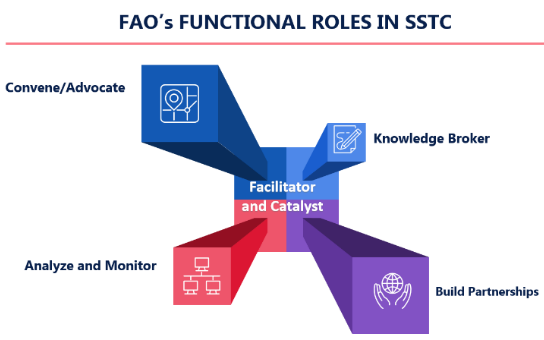What we do
The 2030 Agenda places increasing emphasis on South-South and Triangular Cooperation (SSTC)as both means to support effective capacity-building and the objective of enhancing cooperation. It underscores the need to mobilize resources through SSTC and strengthen SSTC partnerships on capacity-building, science, technology and innovation.
FAO is recognized by its Members and development partners as an innovative, inclusive and trusted partner that fully leverages proven development solutions, resources, knowledge and technologies from the Global South to accelerate agri-food systems transformation, food security, poverty reduction and sustainable use of natural resources.
As a facilitator of SSTC, FAO brings together countries that have development solutions with countries that are interested in adapting and applying them. By bringing partners together, FAO supports SSTC initiatives by:
- Facilitating dialogue between governments, institutions, civil society and the private sector to reach consensus and coordinate policies, strategies and programmes for SSTC;
- Providing a framework for cooperation within which exchanges take place. Using this framework, FAO facilitates mutual learning and ensures that cooperating partners adhere to mutual commitments;
- Offering technical oversight and ensuring international standards are adhered to or adopted in the formulation, implementation, monitoring and impact evaluation of all programmes/projects. FAO ensures that technology and knowledge are adaptable to local conditions and are environmentally and economically sustainable and socially inclusive;
- Working through FAO’s extensive country level presence, allowing for engagement, support and follow-up with national authorities and other relevant stakeholders. In addition, FAO has extensive technical and outreach capacity to identify similar constraints and solutions among regions and across similar socioeconomic contexts; and
- Mobilizing resources for and raising the visibility of South-South and Triangular Cooperation.

